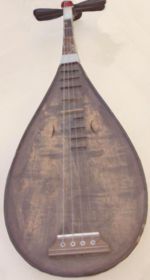Pipa (instrument)
- Pipa (instrument)
-

Pour les articles homonymes, voir
Pipa.
Le pípa (琵琶) est un instrument de musique à cordes pincées traditionnel chinois proche du luth occidental et du oud oriental. Cet instrument apparaît pour la première fois dans des textes datant du IIe siècle av. J.‑C.. La forme dérivée japonaise s'appelle le biwa.
Lutherie
C'est un instrument à quatre cordes en soie dont la caisse taillée dans un bloc monoxyle de bois dur est en forme de poire aplatie, portant souvent gravés dans le dos, des bas-reliefs, ou des incrustations de nacres. Son manche très court se termine par un chevillier courbé. Il compte 30 frettes qui couvrent une partie de la table d'harmonie et offrent ainsi une grande étendue.
Jeu
Depuis la dynastie des Tang (618-907), le pípa a gardé sa popularité en tant qu'instrument soliste et de musique d'ensemble. La technique de jeu est caractérisée par une grande dextérité permettant des effets virtuoses à caractère descriptif. On combine les trémolos obtenus par roulement des cinq doigts, les pizzicatos, le jeu des harmoniques, les bruits...
L'accord de base est La-Mi-Ré-La. La notation pour le pipa combine des symboles pour diapason (système Kung-ch'e) avec des signes abrégés pour des techniques de doigts particulières.
Lien externe
Wikimedia Foundation.
2010.
Contenu soumis à la licence CC-BY-SA. Source : Article Pipa (instrument) de Wikipédia en français (auteurs)
Regardez d'autres dictionnaires:
Pipa (instrument de musique) — Pour les articles homonymes, voir Pipa. Pipa ancien Le pípa (琵琶) est un instrument de musique à cordes pincées trad … Wikipédia en Français
Pipa — Cette page d’homonymie répertorie les différents sujets et articles partageant un même nom. Pippa parfois écrit Pipa est le surnom de Philippa Charlotte Middleton, la sœur de Catherine Middleton, duchesse de Cambridge. Pipa : plage de Tibau… … Wikipédia en Français
Pípa — Pipa Cette page d’homonymie répertorie les différents sujets et articles partageant un même nom. Pipa est une plage de Tibau do Sul au Brésil dans l état de Rio Grande do Norte. Le Pipa est un instrument de musique à cordes pincées traditionnel… … Wikipédia en Français
Pipa — This article is about the Chinese instrument. For other uses, see Pipa (disambiguation). Pipa Classification Necked bowl lutes String instruments Related instruments … Wikipedia
Pipa — 14 bündige Pipa Die Pipa (chinesisch 琵琶 pípá) ist ein Zupfinstrument der klassischen chinesischen Musik. Inhaltsverzeichnis 1 … Deutsch Wikipedia
pipa — or p i p a Short necked Chinese lute. It has a pear shaped body and a fretted fingerboard, and the silk strings are plucked with the fingernails. It is prominent in the opera orchestra and as an ensemble, solo, and accompanying instrument. The… … Universalium
pipa — Traditional musical instrument The pipa is a four stringed, pear shaped, fretted plucked lute from Central Asia that had appeared in China by the seventh century AD. Its body is made out of hollowed out teak covered with a soundboard of wutong… … Encyclopedia of Contemporary Chinese Culture
stringed instrument — a musical instrument having strings as the medium of sound production, played with the fingers or with a plectrum or a bow: The guitar, the harp, and the violin are stringed instruments. * * * Any musical instrument that produces sound by the… … Universalium
Plucked string instrument — Plucked string instruments are a subcategory of string instruments that are played by plucking the strings. Plucking is a way of pulling and releasing the string in such as way as to give it an impulse that causes the string to vibrate. Plucking… … Wikipedia
Angélique (instrument) — Infobox Instrument name=Angélique names= classification= *Necked bowl lutes *String instruments range= related= *Angélique (instrument) *Archlute *Balalaika *Barbat (lute) *Bağlama *Biwa *Bouzouki *Charango *Chitarra Italiana *Daguangxian *Đàn tỳ … Wikipedia
 Pour les articles homonymes, voir Pipa.
Pour les articles homonymes, voir Pipa.
